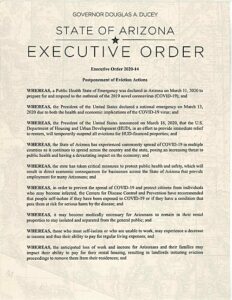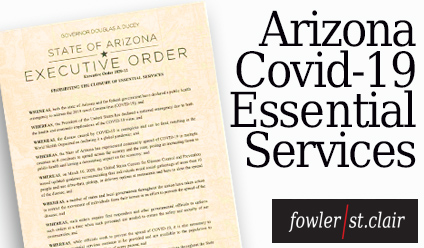We’re going to discuss recent orders from our Arizona Supreme Court along with executive orders from Governor Doug Ducey and how they relate to our clients and others that we work with.
This article and the accompanying video (bottom of the page) contain input from Fowler St. Clair attorneys Dustin Shannaker, Brian Locker and Marin Sorenson who are going to be addressing the administrative orders that have come out from our Arizona Supreme Court.
We’ll address other governmental agencies and courts related to Covid-19 starting first with the most recent order from Arizona Governor Doug Ducey there’s been some confusion regarding the order dealing with the closure of essential services.
Does This Order Close Businesses with Non-Essential Services?

Arizona Executive Order 2020-12 explaining the prohibition of the closure of essential services. Click on the image to see a full-sized version.
Many people have taken the governor’s order as requiring that any business that’s not offering essential services must close.
That’s actually NOT what the governor has done – it’s the opposite.
What the Order Really Says
If you look at the top of the order you will see that it states “prohibiting the closure of essential services.”
Essentially as you read through it you’ll see that paragraph 1 of the order states that, “No county city or town may make any order rule or regulation that restricts the operations of any person from performing the essential services or essential functions as those have been determined by the governor.”
Basically all of the essential businesses and operations and services that a city, town or county can require the closure of, and it’s a pretty broad list. Please understand that the governor has not issued an order requiring any business that falls outside of these services to close.
The governor may at some future order closures, but at this point, that order has not been issued. Certain businesses have closed or believe that they need to close because of this order. Please read the order carefully and thoroughly before making a decision.
What About Real Estate Related Businesses?
Our firm does a lot of work in the area of real estate. I want to address the provisions related to the operation of real estate businesses.
If you look under professional and personal services you will see that it includes real estate services. (Section xix). Some people have interpreted this to mean that it’s only appraisal and title services.
That’s not the case.
It’s saying including appraisal and title services. But just because it includes something doesn’t mean it excludes anything else. So, the way we understand this is, any real estate related service is considered an essential function or essential business that can continue to operate.
Administrative Orders from the Arizona Supreme Court
Regarding recent administrative orders from the Arizona Supreme Court which basically put certain time limitations in place on existing and active matter.
Administrative Order 2020-47
The first was issued on March 16th of 2020. Administrative order 2020-47.
This order puts a stay in place for the period of March 16, 2020, through March 31, 2020, for any civil matter pending before the court.
This includes:
- certain criminal matters
- certain juvenile matters
- as well as eviction matters
What this initial order was saying is anything that was due after March 16th you are going to be given a 15-day extension from March 31.
You receive a 15-day extension from anything that was due. If anything was due between March 16th through March 31st you will receive an extension after March 31st for the time period for which that would be due.
If something was due March 17 then that item would be due April 1st. But if something was due after March 31 you want to count the time periods of March 16th to March 31.
If something was due April 1st it would now be due on April 16th. As a result, we have responded accordingly as a firm with our calendaring of deadlines.
Administrative Order 2020-48 and How it Affects Civil Proceedings
However, the Arizona Supreme Court then issued administrative order 2020-48. This order was issued on March 18, 2020, which replaced Order 2020-47. We will cover what this means in civil proceedings now that we have this new order in place.
Generally speaking, what you’re going to find is that the courts are going to be unbelievably conscientious about the disruption that Covid-19 is causing. This applies to litigants (defendants and plaintiffs) as well as law offices.
They are going to ensure that nobody is caught up in the process and has negative consequences taken as a result of deadlines and that sort of a thing. One thing that we can be sure of is as these orders are coming in it’s causing confusion than anything else.
Details on Supreme Court Order 2020-48
Order 2020-48 orders that all in-person proceedings in all Arizona appellate, superior, justice, and municipal courts and before the presiding disciplinary judge are avoided to the greatest extent possible consistent with core constitutional rights until further order of this court.
Oral Arguments vs Evidentiary Proceedings
We have personally seen the impact in our litigation practice. Any in-person oral arguments have been changed from in-person to telephonic arguments.
This works well for issues that involve legal resolution. However, in cases where there are evidentiary proceedings has become much more difficult
These are instances where people have to produce evidence, and where we’re needing to see a document or hear a person testifying.
The Supreme Court has empowered the various courts in our jurisdiction to take any and all actions necessary to be able to promote social distancing.
Rules of Procedures for Eviction Actions
Evictions are being affected by these new orders. From March 18, 2020, through April 17, 2020, these dates are excluded from the calculation of time under rule provisions and statutory procedures that require court proceedings to be held within a specific period of time.
To the extent that a court must hear an eviction proceeding within a specific period of time—when you file a residential eviction action the court must take that up within 10 court days—that time period is now extended till after April 17th, 2020.
Landlords who have tenants who are not paying rent and an eviction notice is served, a court does not even have to hear that case until after April 17th.
In addition to the 30-day delay, the governor’s order put a 120-day moratorium on the enforcement of eviction actions.
Consequently, after April 17th when the court starts hearing these new eviction actions and landlords are issuing eviction orders, the Governor has specifically ruled that these eviction orders are not even to be enforced for a period of four months.
Read Arizona Executive Order 2020-14

Arizona Executive order 2020-14. Click to see a full-sized .pdf version
This is a major issue for landlords in Arizona who have non-paying tenants.
The governor specifically says that this 120-day moratorium is for individuals who have suffered a substantial loss of income resulting from Covid-19.
The issue with this non-enforcement period for a landlord is far-reaching:
If a tenant experienced:
- a job loss
- reduction in compensation
- the closure of the place of employment
- absenteeism from work to care for a school-aged child
- Or other “pertinent circumstances”
They cannot be evicted.
As a litigator, any tenant who is unable to pay their rent is going to be able to point to this executive order and receive a carte blanche delay in any eviction for this period of time.
Commercial Tenant and Landlord Eviction Action
You may be wondering how these changes apply in the commercial landlord-tenant setting. The actions that we’ve seen here deal with enforcement on the part of the government.
Enforcement of eviction orders and things of that nature as well as the extension of time imposed by statute or civil rule, does not affect the ability of commercial landlords to do things like lock outs. That is unless the landlord requires the use of these enforcement agencies like the sheriff’s office.
So the brief answer is that these eviction rule changes do not apply as much to commercial landlords.
Commercial Tenants with Business Income Reductions
As a firm that represents a number of commercial tenants, one of our clients’ businesses is going to be affected negatively by the Corona-Virus lockdown. They are an entertainment type tenant that is greatly affected by people not going out and spending discretionary income.
Our input to them was that the last thing a commercial landlord wants in their shopping malls or strip centers is a vacancy. Because once the economy starts moving again and people are going out and spending money, they don’t want empty shopping centers.
Landlords should be more willing to address these financial hardships and work with their tenants to make sure that they don’t have mass evictions.
Evictions at this time just don’t make sense for anybody right now.

